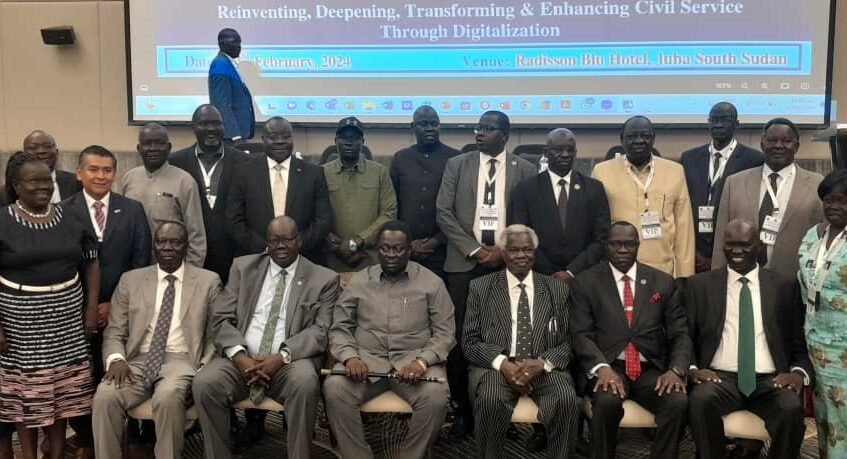You are here: Home | Economy | Governance | News | States | South Sudan introduces first-ever biometric payment system

South Sudan government officials including Vice President Abdelbagi Akol and World Bank representatives launch biometric payment system in Juba. (Photo: Obaj Okuj).
The South Sudan government has introduced a World Bank-funded biometric payment system for effective data management and initiating an accurate payroll for civil servants.
The biometric payment system, which uses a customer’s physical characteristics to authorize payment or complete a point-of-sale transaction, is said to be a huge step in the fight against corruption in the country.
Dak Duop Bichiok, the Minister of Public Service and Human Resource Development, said the system aims to mitigate unethical payroll activities including ghost workers.
He said the system is a crucial element in the ministry’s efforts to verify all civil servants.
“The integration of biometrics in the payroll system stands out as a crucial element in our efforts of cleaning and updating the civil service,” Duop said.
“By conducting a biometric integrations and verification of all civil servants, we aim to mitigate the risk and unethical payroll activities, particularly the control of potential ghost workers.”
Minister Duop voiced gratitude to the Ministry of Finance and Planning and the World Bank for supporting the launch of the initiative which he terms as an important reform.
“Our gratitude extends to the Minister of Finance and Planning and the World Bank for their unwavering support to the ministry of public service and human resource development in taking this important reform.”
The new payroll management system will require updating of the payroll database to ensure accurate staff records are maintained by the government.
It also provides a platform for addressing any concerns stakeholders may have about salaries.
Vice President for Service Cluster, Hussein Abdel-Bagi said the payment system is important for all government sectors and workforce including the organized security forces.
“The introduction of the human resource management information system must include all government and workforce more especially the army, the police, and the other organized security forces,” he said.
“By harnessing the power of modern technology, we aim to streamline our human resource management process enhancing transparency and eliminate opportunities for length activities within the civil server.”
For his part, David Santo, representative of the World Bank, which funds the biometric system, expressed his commitment to providing technical assistance to the government on the system.
Mr. Santo highlighted their dual roles in the project.
“The activity of payroll management information system aims to first to have a clear inventory of public servants and then have a continuous process of expediting the payments of different salaries but control in addition, how the budget is used for these resources.”
“Now having a variable integration between the ministry of public finance and ministry of public service will allow the country to have very fiscal management in the country.”
The project, supported by the World Bank with a budget of 34 million US dollars, is expected to span four years.
According to the World Bank, the biometric payment system in South Sudan is critical for Public Financial Management reforms enshrined in the 2018 revitalized peace deal.
The Bank said lack of the identification system has brought a number of challenges in the South Sudan civil service sector, including lack of accurate number of public servants and absence of instrument to control so-called ghost and duplicate position.
Other setbacks are the lack of control allowances and disconnection between the public service and the finance ministries, which negatively impact timely salary payment.
The main objectives of the biometric system are to identify real civil servants, provide inventory for pay grading and positions.
It will also be used to speed up payment processes and make strategic decisions, as well as effect transparency and accountability.
Support Eye Radio, the first independent radio broadcaster of news, information & entertainment in South Sudan.
Make a monthly or a one off contribution.
Copyright 2024. All rights reserved. Eye Radio is a product of Eye Media Limited.